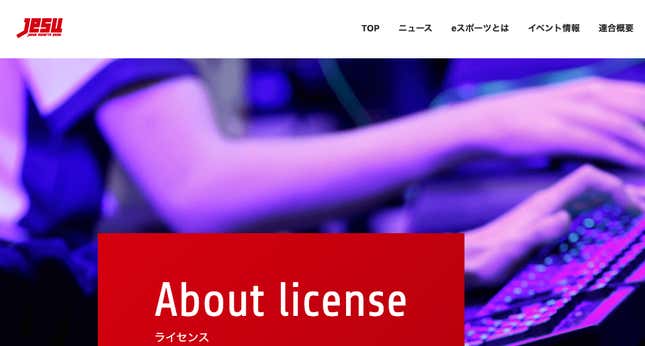
In Japan, there is a gaming license system that defines what a pro player is. The system was established in February 2018 and nearly two years later, the awkward stop-gap seems like a mess.
The reason given for creating this gaming license is to get around the legal restrictions that have prevented esports from taking off in Japan. As previously reported, there is a 100,000 yen ($895) ceiling on cash prizes that can be legally awarded at esports events in Japan that are seen as geared towards selling a particular product (here, video games). Previously, Japan’s Nikkei explained that this is due to a law combating “unjustifiable premiums and misleading representations.” The license loophole apparently avoids any trouble.
Japan Esports Union (JeSU) created a definition of a pro-gaming and a licensing system. But there have been issues, such as Yusuke Momochi running into snags after winning a tournament without said license. Therefore, while the license system might help players sidestep certain legal issues, it has created situations like this where it’s possible to dominate a tournament in Japan and not be able to collect your full winnings.
The criticism against JeSU has been that it not only creates a narrow, highly controlled esports pro definition, but also that the license system itself is a business model, giving the bureaucratic organization a steady stream of income.
Things are not clear cut. According to Yahoo! Japan (via Mulboyne), JeSU appeared to state that the license was created at the recommendation of Japan’s Consumer Affairs Agency. However, that agency is quoted as saying that when JeSU proposed the idea, CAA simply said that creating such a license might be easily understood. “And we did not say assertively say to create it,” the agency’s head is quoted as saying. So it sounds like the license was apparently JeSU’s idea, and it’s not even clear if this is the best approach—or even needed for that matter.
In a Yahoo! Japan article from last September, the Consumer Affairs Agency also stated that the monetary awards in a tournament falls under goods and services paid to someone for work and not as a gift. This would mean that the prize money itself would be considered a salary, which would then prove that JeSU’s licensing system is unnecessary. The article indicates that it doesn’t appear there are legal restrictions on players in Japan to receive money. But there doesn’t yet appear to be a real-world precident, which might make some players nervous about this interpretation.
Esports is still very much a new business in Japan. Whether or not the license is even needed doesn’t seem settled to the frustration of players and fans alike. No doubt Japan has the talent for a thriving esports scene, but as of now, it certainly doesn’t have the environment for it.